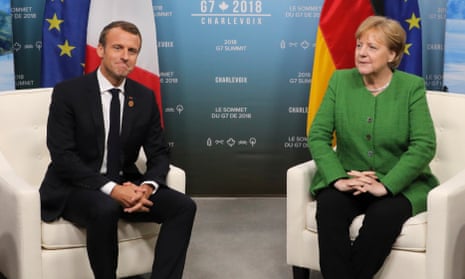Emmanuel Macron returns home from his run-in with Donald Trump at the G7 summit to face what looks like an unresolvable European equation. For years, Germany worried that France was too weak a partner in Europe. Paris made promises it could not keep, failed to get its house in order and then blamed German intransigence for its own problems. Now, finally, France has called Germany’s bluff –but is not getting the response it had hoped for.
Macron took office determined to restore balance to what had become an uneven Franco-German relationship, tilted towards mighty Germany. To the question: “Who runs Europe?”, the answer had been simple: Angela Merkel. German expectations about France’s ability to stick to its commitments, reboot its economy and bring down unemployment were low. This offered Berlin an easy response to demands from Paris, particularly when it came to reforming the eurozone: sort out your domestic problems first and then we’ll talk.
Nobody in Berlin expected Macron to pass his labour reform last September without provoking chaos on the streets. When it went through, with little fuss, German sceptics turned their attention to France’s excessive budget deficit. Three times between 2009 and 2015 the French had pleaded with the European commission for extra time to bring their budget deficit down below the official cap. How could France expect Berlin to take its euro-zone proposals seriously when the country was incapable of obeying even basic EU rules?
Last year, however, Macron’s government passed a French budget that respected the EU’s limit for the first time in a decade. Today, after 10 weeks of strikes, he is on the verge of victory in his standoff with the unions over the reform of SNCF, the national railways.
The young president calculated that his political clout in Europe, and by extension his capacity to project France’s voice abroad, depended on his ability to revive the French economy and prove to sceptics that the country was both credible and reformable. Shortly after his election, one of Mr Macron’s advisers told me: “He will surprise them, because the Germans don’t believe it will happen.”
Today, nine months after he made an impassioned plea at the Sorbonne for a reshaped Europe, based on closer integration of the eurozone and a common fiscal capacity, Macron is still waiting. Merkel’s initial response, laid out in an interview and a speech earlier this month, was cautious: high on technicité, but low on overarching ambition or vision. The two leaders meet in Berlin on 19 June to try to find common ground, before a European council summit at the end of the month.
Mr Macron’s impatience is patent, but it is not new. “Europe needs to wake up!” he told me when I interviewed him last July in his high-ceilinged corner office at the Elysée, which overlooks the sweeping palace lawns. With the US volatile and morally adrift, Britain in retreat because of the all-absorbing complexities of Brexit and illiberal powers on the continent’s doorstep, the French president senses an unusual – and probably brief – opportunity for the EU: a chance to fashion a stronger centre and reassert itself and its values as a guarantor of the democratic liberal order.
“What world are we living in?” he continued. “Our responsibility is immense. We need to stop holding crisis summits around hyper- technical subjects. We need to define another horizon together. We can be the leaders of tomorrow’s world.” It was up to Germany, he argued, to decide “whether it is ready to join France in a remaking of Europe”. The currency area remains fragile, and Europe disconnected from its citizens. Macron has no illusions about the price of failure. The choice, he judges, is about whether liberal democratic politics can prevail and whether Europe can hold together.
Closing the gap between French hopes and German fears will be challenging. Merkel is bound by domestic party constraints and her country’s fears that French plans amount to a giant sucking movement from its wealthy heartlands to the profligate south. Just days after the French election, the cover of Der Spiegel captured German views with an image of Macron under the heading “Teurer Freund” – which means dear friend, in both senses of the word. To the east of the Rhine, Macron, with his powdered brow and talk about French grandeur, is regarded with unease.
Ever since Charles de Gaulle and Konrad Adenauer codified the Franco-German relationship in 1963, signing the Elysée treaty under the crystal chandeliers of the presidential palace, Berlin and Paris have sought to forge agreement by overcoming their reflexive differences. The two neighbours have built a web of institutional links to ensure that the governments meet and talk often. In recent weeks, Bruno Le Maire, the German-speaking French finance minister, has sat down with Olaf Scholz, his German counterpart, for many hours of one-on-one talks to try to find common ground. Le Maire argues that French help in defending European industry from American tariffs should be matched by a Germany effort on eurozone reform.
If the current tension between Europe and the US teaches anything, it is that there are shared European values and that these need defending. In Macron, the continent has an unusual champion of multilateralism and the liberal order, who sees a more integrated Europe as the best bulwark against those who seek to undermine the west. Yesterday, Germany worried about an enfeebled France. Today, it faces a France that is turning out to be highly ambitious, indefatigably demanding – and still waiting. Sophie Pedder, the Economist’s Paris bureau chief, is author of Revolution Française: Emmanuel Macron and the Quest to Reinvent a Nation
